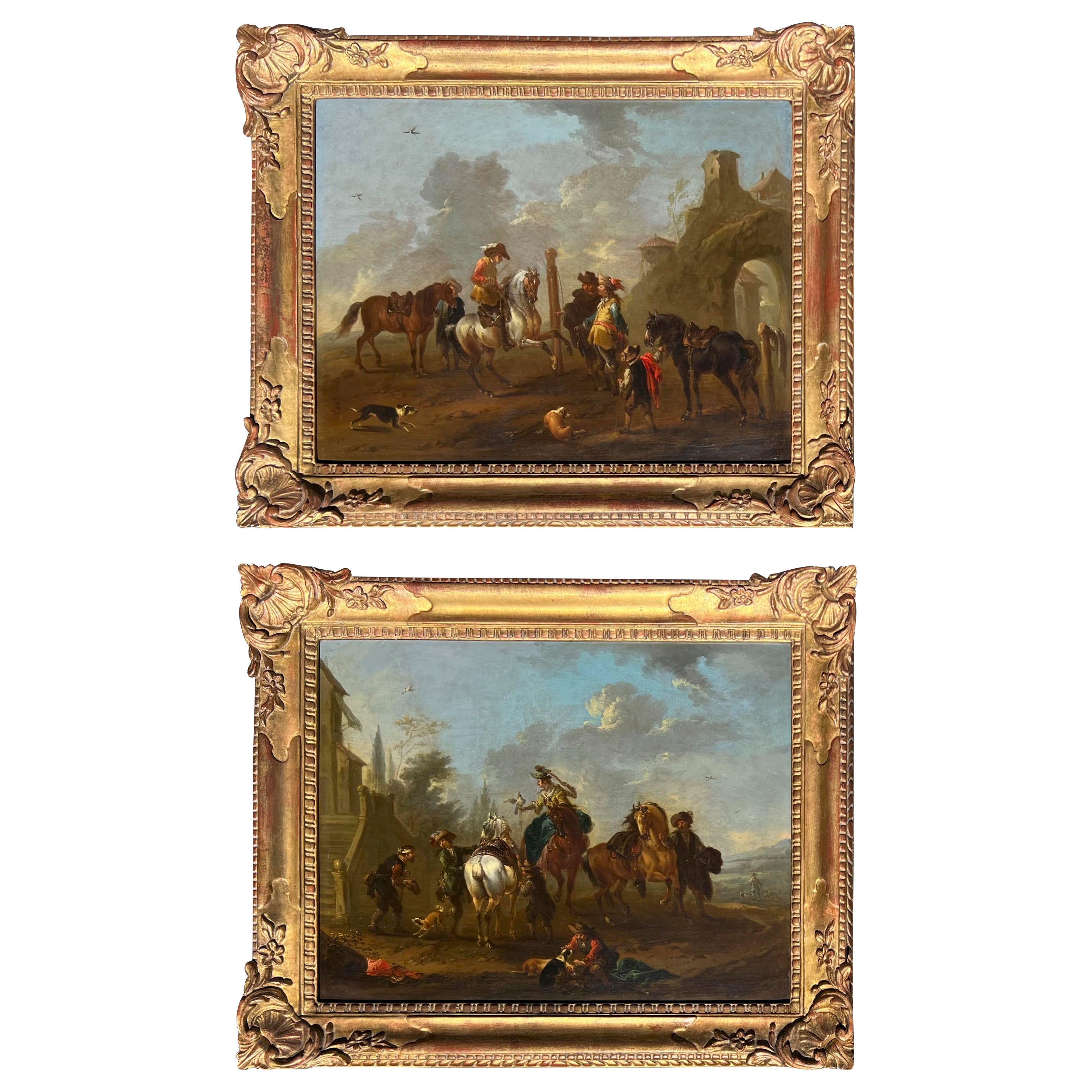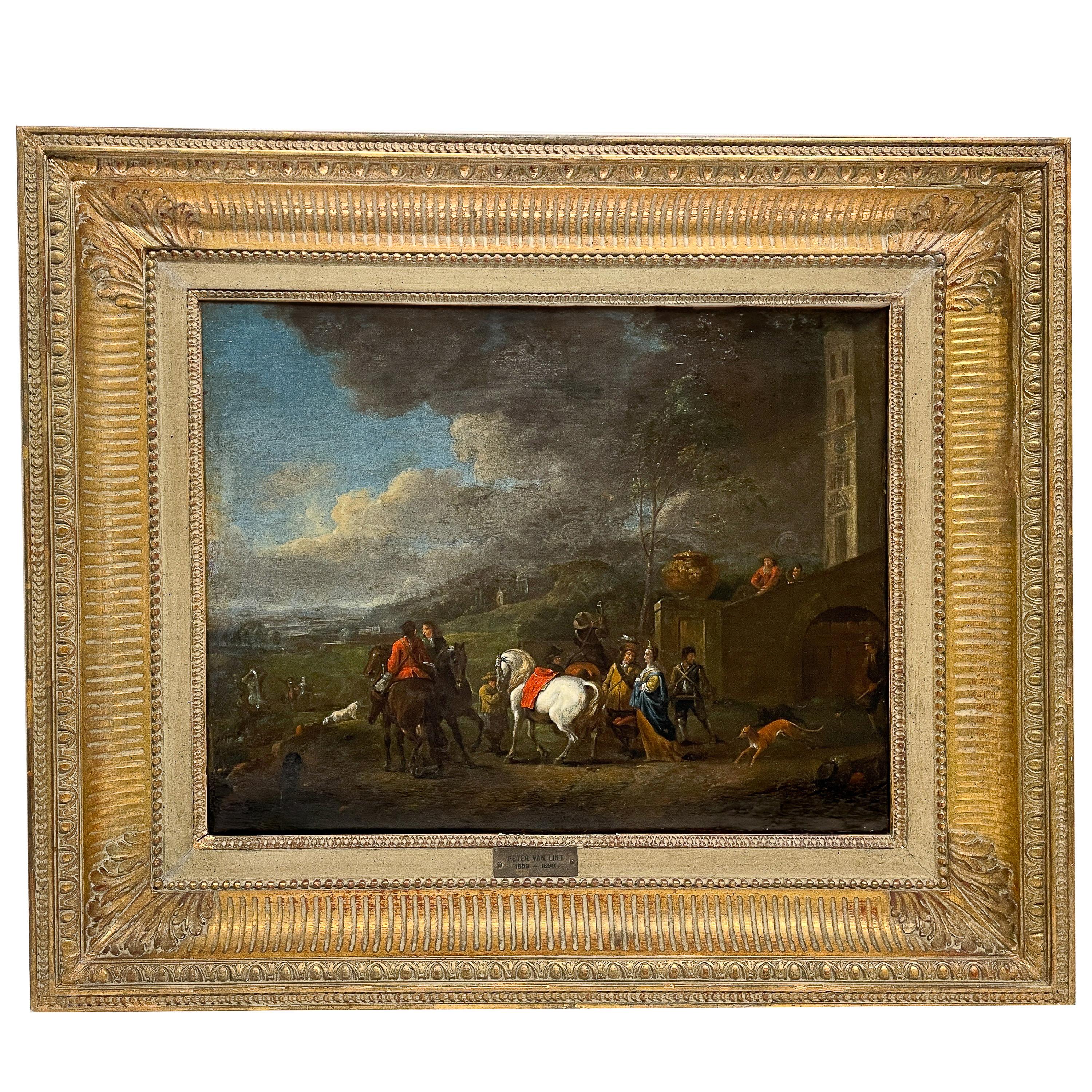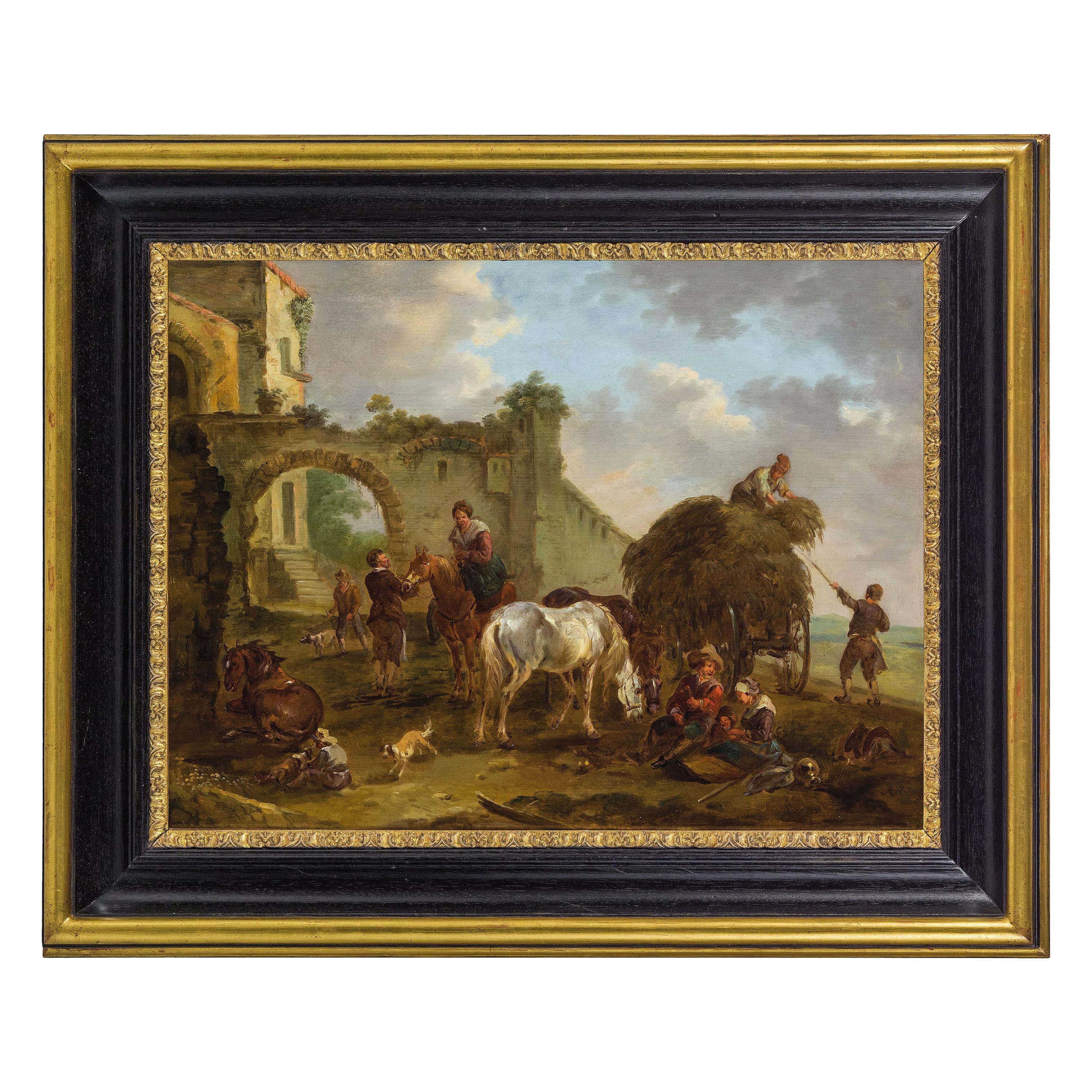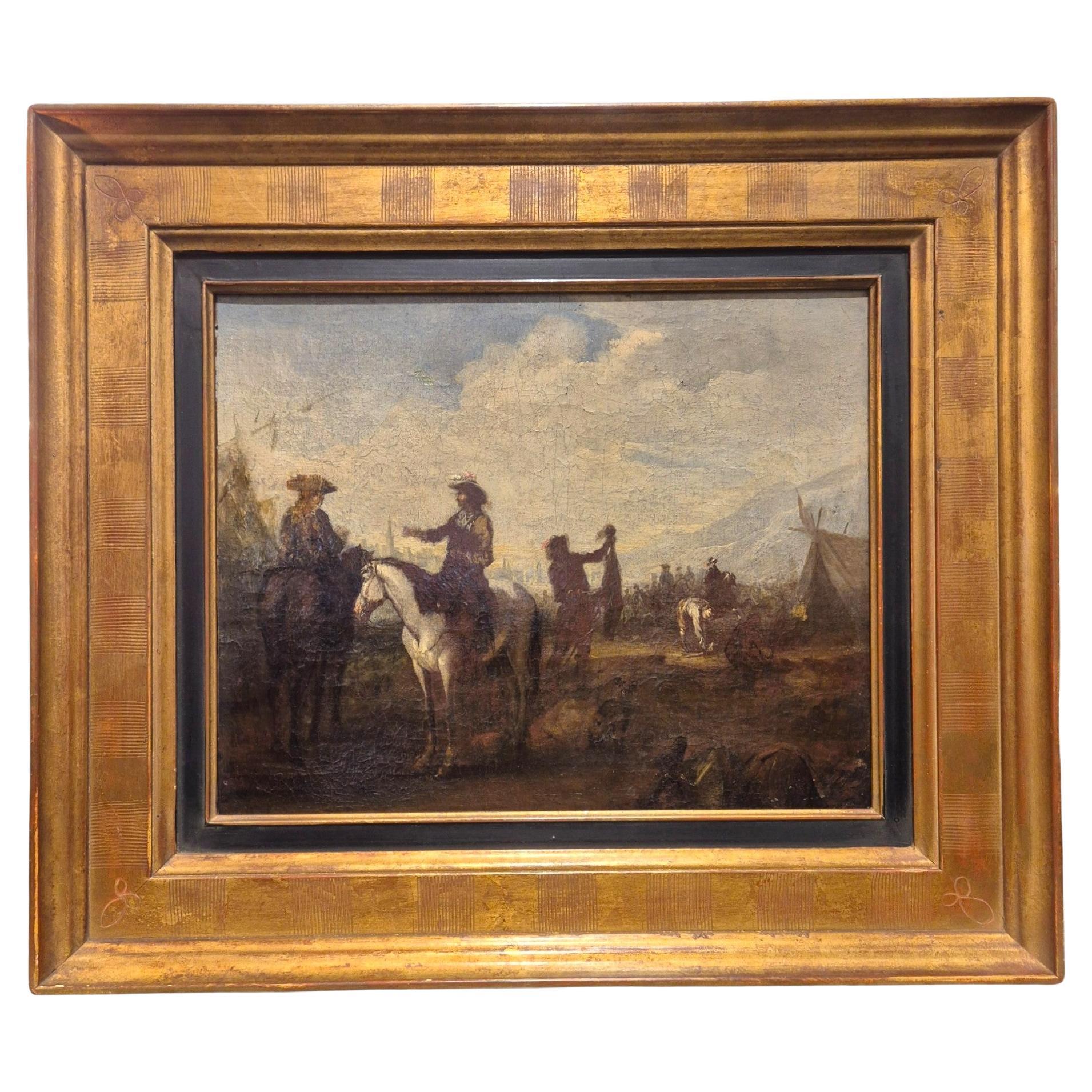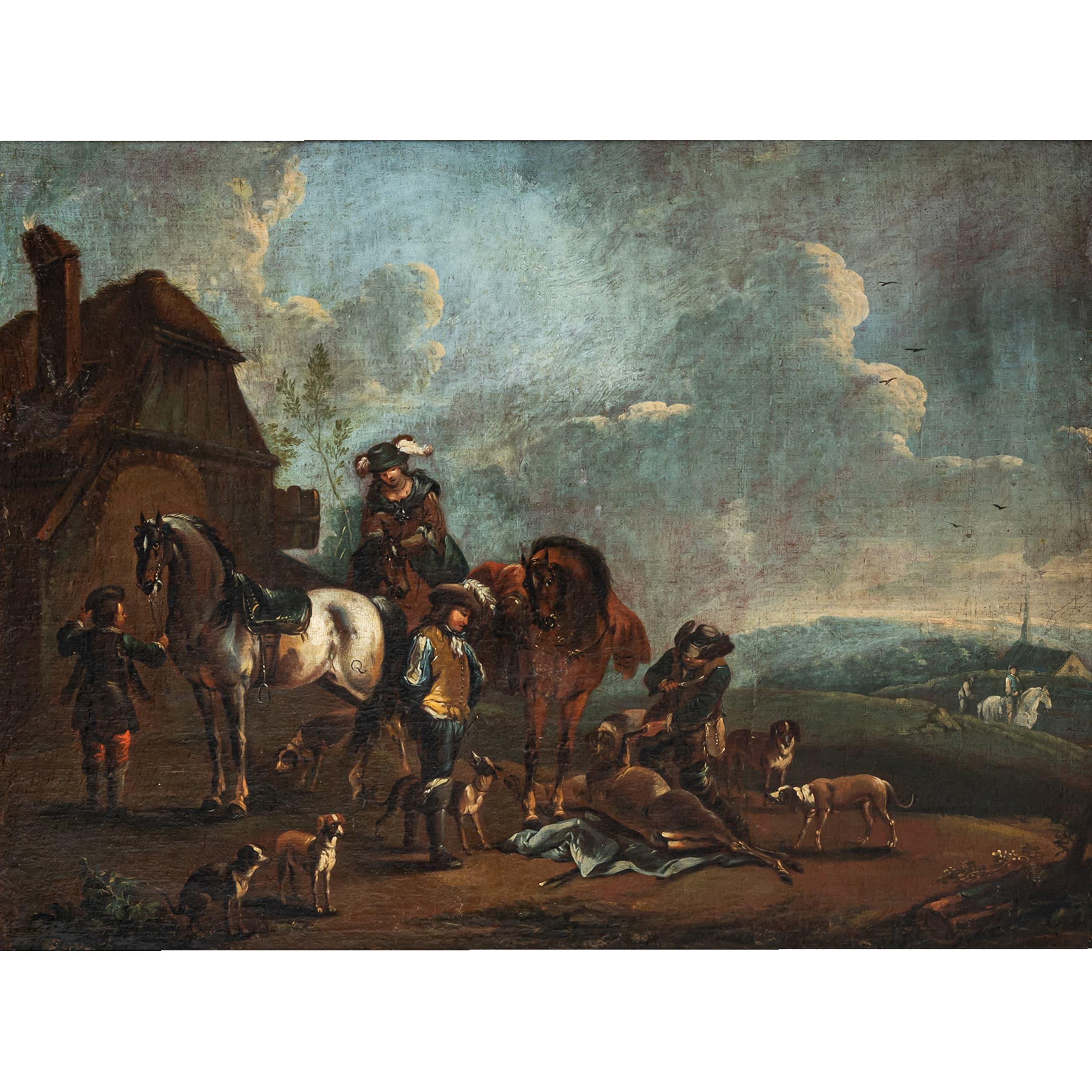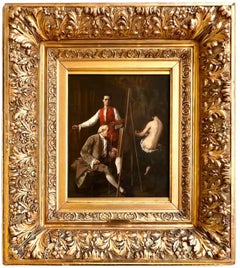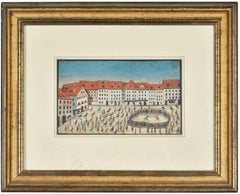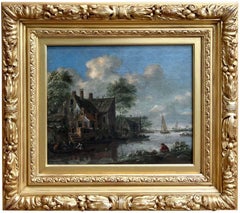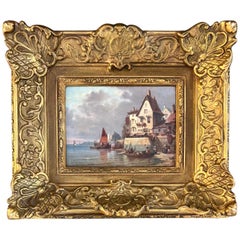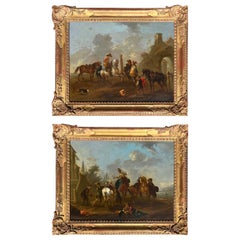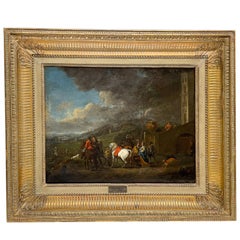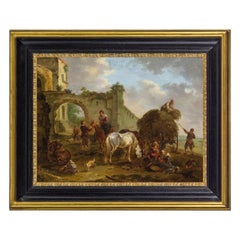Items Similar to An Elegant Hawking Party, A Pair of Paintings
Want more images or videos?
Request additional images or videos from the seller
1 of 11
August QuerfurtAn Elegant Hawking Party, A Pair of PaintingsEarly 18th Century
Early 18th Century
$14,800
£11,169.15
€12,786.99
CA$20,872.91
A$22,915.85
CHF 11,955.25
MX$277,313.67
NOK 149,840.47
SEK 141,189.11
DKK 95,451.48
About the Item
A pair of old master paintings by August Querfurt (1696-1761). Oil on panel, one signed with initials in the lower left. Two scenes depicting hawking parties from the 18th century. In wonderful condition and ready to hang. The dimensions listed are if the two were hung one on top of the other. The paintings each measure 18" x 22.25," including the frames. The listed dimension is if they were stacked vertically, if displayed horizontally next to one another the dimension would be approximately 18" x 45.5".
Provenance:
Sothebys NYC 1991
Colnaghi Gallery NYC
Private Collection
Bradbury Art and Antiques, Wiscasset, ME
August Querfurt (1696-1761) is most well-known as a painter of soldiers and battle scenes. He was born in Wolfenbuttel, Vienna in 1696. His father, Tobias, a landscape and animal painter and the Brunswick Court Painter, was young August’s first teacher. He studied under Rugendas and spent most of his professional career in Augsburg, Vienna. His paintings were thought to be modeled on the works of Wouvermans. In 1752, Querfurt became a member of the Academy of Vienna. Querfurt painted a series of 12 paintings for Duke Karl Alexander of Württemberg. Two of those paintings, The Battle of Belgrade and The Battle of Blenheim were 11 meters by 4 meters. Querfurt painted 8 pieces for Empress Maria Theresa (1717-1780) of events from the War of Austrian Succession (1740-1748). The works for the Empress are now housed in the Museum of Military History located in Vienna. Querfurt lived during a very turbulent time. The Holy Roman Empire, The Ottoman Empire, the Hapsburgs, Great Britain and a number of other forces fought several battles in and around Vienna while Querfurt was living there. In some ways it was perhaps destined for the artist to primarily paint military landscapes of battles and portraits of soldiers as for much of his life, his country was at war. Querfurt died in Vienna in 1761.
- Creator:August Querfurt (1696 - 1761)
- Creation Year:Early 18th Century
- Dimensions:Height: 37 in (93.98 cm)Width: 22.5 in (57.15 cm)Depth: 1 in (2.54 cm)
- Medium:
- Movement & Style:
- Period:
- Condition:
- Gallery Location:Wiscasett, ME
- Reference Number:1stDibs: LU506315057932
About the Seller
5.0
Vetted Professional Seller
Every seller passes strict standards for authenticity and reliability
Established in 1999
1stDibs seller since 2016
110 sales on 1stDibs
Typical response time: 2 hours
- ShippingRetrieving quote...Shipping from: Wiscasett, ME
- Return Policy
Authenticity Guarantee
In the unlikely event there’s an issue with an item’s authenticity, contact us within 1 year for a full refund. DetailsMoney-Back Guarantee
If your item is not as described, is damaged in transit, or does not arrive, contact us within 7 days for a full refund. Details24-Hour Cancellation
You have a 24-hour grace period in which to reconsider your purchase, with no questions asked.Vetted Professional Sellers
Our world-class sellers must adhere to strict standards for service and quality, maintaining the integrity of our listings.Price-Match Guarantee
If you find that a seller listed the same item for a lower price elsewhere, we’ll match it.Trusted Global Delivery
Our best-in-class carrier network provides specialized shipping options worldwide, including custom delivery.More From This Seller
View AllThe Painter and His Muse
By Benjamin Eugène Fichel
Located in Wiscasett, ME
Oil on panel signed in the lower right corner and presented in a period frame measuring 21" x 18.5".
Provenance:
Private Collection
Bradbury Art and Antiques, Wiscasset, ME
Benj...
Category
19th Century Baroque Figurative Paintings
Materials
Oil
The Great Duel 18th Century
Located in Wiscasett, ME
A truly rare and remarkable scene of hundreds of swordsmen meeting in a towns square. The circle is closed around the two in the duel, each of whom have drawn blood. German school 18...
Category
1750s Folk Art Figurative Drawings and Watercolors
Materials
Watercolor
Village by the Lake
Located in Wiscasett, ME
Old master painting featuring a busy port city in the 17th century. Most likely Dutch and very close in style to the work of Thomas Heeremans. This is...
Category
17th Century Old Masters Landscape Paintings
Materials
Oil
European City on the Water
By Charles Euphrasie Kuwasseg
Located in Wiscasett, ME
Oil on canvas, signed and dated in the lower left corner. A tranquil painting featuring a European city on a lake or river at sunrise or sunset. Char...
Category
19th Century Victorian Landscape Paintings
Materials
Oil
Pair of Country Life Scenes
By George Henry Durrie
Located in Wiscasett, ME
A pair of oil on panel paintings featuring the "Farm in Autumn" and "A Fisherman in the Mountains".
Autumn initialed 'D' lower right and The Fisherman s...
Category
Mid-19th Century Landscape Paintings
Materials
Oil
The Faithful Companion
By Mari ten Kate
Located in Wiscasett, ME
This wonderful painting features a loyal dog watching over a napping baby in a sunny courtyard. It is an oil on board and features a period, possibly original, frame and is signed in...
Category
19th Century Victorian Landscape Paintings
Materials
Oil
You May Also Like
"An Elegant Hawking Party" A Pair of Paintings by August Querfurt
Located in Wiscasset, ME
Pair of old master paintings by August Querfurt (1696-1761). Oil on panel, one signed with initials in the lower left. Two scenes depicting hawking parties from the 18th century. ...
Category
Antique 18th Century Austrian Baroque Paintings
Materials
Paint
Flemish Early 17th Century Old Master Oil on Panel Painting Hunting Scene 1620
Located in Portland, OR
A highly important Flemish Old Master oil painting by Peter Van Lint (1609-1690), titled "Preparing for the Hunt", the painting is dated & signed by the artist, 1620. The painting wa...
Category
1620s Old Masters Landscape Paintings
Materials
Oil, Panel
Travellers and Carriage in Landscape Dutch 17th century Golden Age oil painting
Located in Hagley, England
This superb Dutch Old Master Golden Age oil painting is attributed to Pieter Bodding van Laer. Painted circa 1635 the composition is a group of travellers who have stopped to rest. I...
Category
17th Century Old Masters Landscape Paintings
Materials
Oil
$13,234 Sale Price
20% Off
18th Century, Baroque Austran Painting by August Querfurt
Located in IT
August Querfurt (1696, Wolfenbüttel - 1761, Vienna)
Farmers and villagers at the entrance of a village
Oil on panel , cm 38,5 x 51. frame 66 x 53,5 x 4,5 cm
The valuable painting, ...
Category
Antique 18th Century Austrian Baroque Paintings
Materials
Wood
Court hunting scene, Flemish school of the late 17th century, Oil on canvas
Located in NICE, FR
This richly narrated painting probably takes us back to a hunting scene at court in the late 17th or early 18th century.
In the left foreground, two men on horseback are engaged in ...
Category
Antique 1690s Dutch Louis XIV Paintings
Materials
Canvas
$3,446 Sale Price
20% Off
August Querfurt (attributed, 1696–1761), Hunting Party, First Half of the 18th C
By August Querfurt
Located in Greding, DE
Oil painting depicting a vivid hunting scene with a mounted party, accompanied by hunting dogs and a slain doe in the foreground. Set against a sweeping landscape with a farmhouse, t...
Category
Early 18th Century Landscape Paintings
Materials
Oil
More Ways To Browse
Tobias Antique
Military Portrait
Antique Military Portraits
Pair Antique Oil Painting
Karl Alexander
Oil Paintings Of Ballerinas
Roger Fry
Scottie Wilson
Vintage Girl Reading
Vladimir Dimitrov
Airplane Paintings
Anna Mary Robertson
Architectural Relief Sculpture
Breast Painting
Devil Oil Painting
Diving Board
Ferrari Car Art
French Soldier Painting
